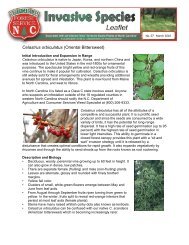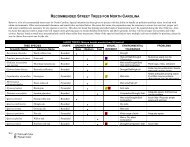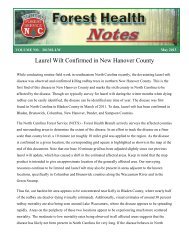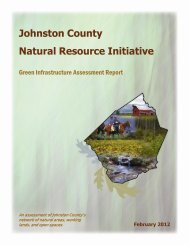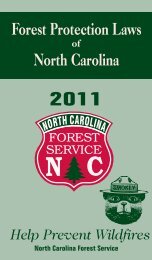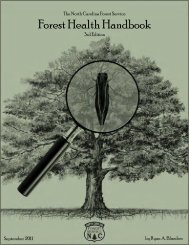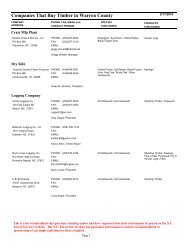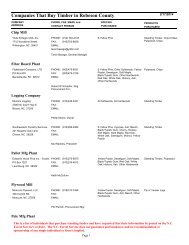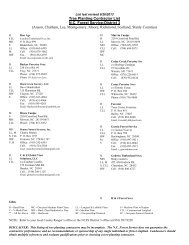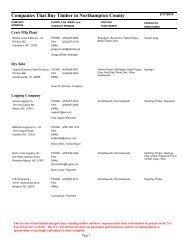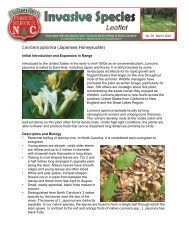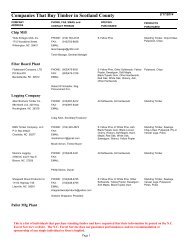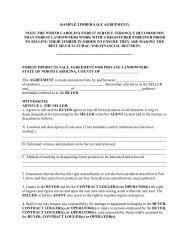Northampton County Honors the Morey's - NC Forest Service
Northampton County Honors the Morey's - NC Forest Service
Northampton County Honors the Morey's - NC Forest Service
- No tags were found...
Create successful ePaper yourself
Turn your PDF publications into a flip-book with our unique Google optimized e-Paper software.
search continues on o<strong>the</strong>r possibilities.17Where control efforts fail, land managers should anticipate hazards and o<strong>the</strong>r impacts from deadand dying trees. In recreation areas near streams, for example, trees may need to be felled to minimize hazards,and stream crossings should be carefully monitored to ensure that culverts remain clear. In order tomaintain or restore <strong>the</strong> benefits provided by hemlock trees, restoration efforts may require novel approachessuch as <strong>the</strong> introduction of nonnative or hybridized hemlock species, facilitated movement of nativespecies to new habitats, and aggressive management of existing undesirable species to benefit desirablespecies. In all cases, monitoring will be required to evaluate efforts and guide adaptive approaches.—Patty Matteson—Access <strong>the</strong> full text of <strong>the</strong> article with matrix of management options.For more information, email Jim Vose at jvose@fs.fed.us.Haywood <strong>County</strong> Wood Products Under <strong>NC</strong>DA&CS QuarantineFor Thousand Cankers DiseaseRALEIGH–The N.C. Department of Agriculture and Consumer <strong>Service</strong>s has placed Haywood<strong>County</strong> wood products under quarantine due to a recent detection of thousand cankers disease in <strong>the</strong> GreatSmoky Mountains National Park.“This marks <strong>the</strong> first time <strong>the</strong> disease has been detected in <strong>the</strong> state, and by placing restrictions on avariety of plant material and wood products, we hope to keep <strong>the</strong> disease from spreading into o<strong>the</strong>r counties,”said Agriculture Commissioner Steve Troxler. “Something as simple as moving firewood from an infectedarea to an uninfected county could increase <strong>the</strong> risk of spreading this disease.”Thousand cankers disease is a newly recognized disease primarily affecting black walnut trees. It iscaused by <strong>the</strong> Geosmithia morbida fungus, which is spread by <strong>the</strong> walnut twig beetle. Thousand cankersdisease has produced widespread death of black walnuts in many western states during <strong>the</strong> past decade.O<strong>the</strong>r species of walnut, such as Arizona walnut, English walnut and California walnut, have also shownvarying degrees of susceptibility to this fungus.The following items fall under <strong>the</strong> quarantine restrictions: walnut plants and plant parts includingfirewood, lumber, logs, stumps, roots, branches, and composted and uncomposted chips. Regulated itemscannot be moved outside <strong>the</strong> county. Exceptions to <strong>the</strong> quarantine restrictions include nuts, nut meats,hulls, processed lumber with square edges that is 100 percent bark free and kiln-dried, and finished woodproducts without bark, such as furniture, instruments and gun stocks.<strong>NC</strong>DA&CS Plant Industry Division and N.C. <strong>Forest</strong> <strong>Service</strong> personnel will continue to monitorcounties across North Carolina for <strong>the</strong> presence of this disease. Anyone with questions about this quarantineshould contact Phil Wilson, <strong>NC</strong>DA&CS plant pest administrator, at 919-707-3730, or go to <strong>the</strong> websitehttp://ncforestservice.gov/forest_health/forest_health_thousandcankers.htm



